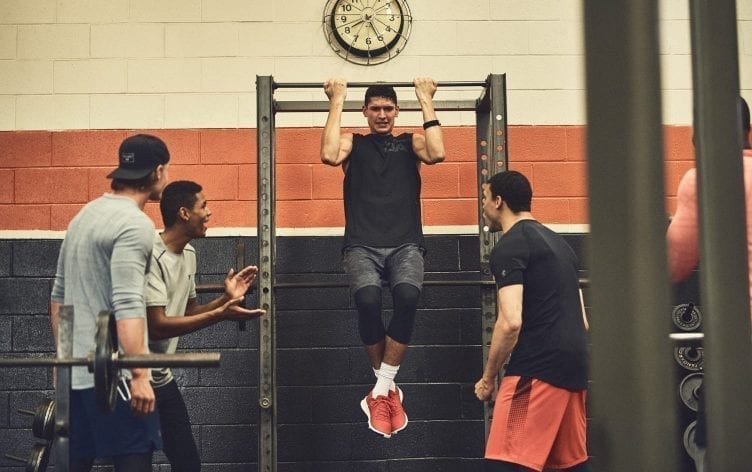If You Work Out for Years Then Stop Will You Get Muscle Back When You Start Again
How Speedily Tin You Regain Strength After Taking a Break?
by Lauren Bedosky
June 26, 2019

Getting ill, being injured or just needing a pause are all valid reasons to occasionally take time abroad from your workout routine. But sometimes these breaks last longer than we anticipate and many of us worry we'll lose all the strength nosotros worked so hard to build and end upward starting back at foursquare ane.
It's prophylactic to say taking a recovery day is considered best do for a responsible training routine. Then, while a day is great, how about a week? What nearly a month? How rapidly do y'all lose strength once yous end training? The answer might not be equally fast as you call back: "Most experts hold that large losses in strength don't happen for well-nigh three months, with smaller, less meaning losses starting effectually 3–four weeks," says personal trainer Ashleigh Kast, a NASM performance enhancement specialist.
A review published in Sports Medicine, for example, found elite rugby and football players could go three weeks without training earlier their strength levels started to decline. Similarly, enquiry on not-athletes found they were also able to take three weeks off from training without seeing any declines in forcefulness or muscle mass.
Even if you lot have to take as much as iii months off from training, rest assured it won't take you besides long to regain your strength — peculiarly if you were training consistently before your hiatus.
Exactly how long it takes to regain your force is hard to say, because information technology takes more than muscular strength to pull off an exercise. For example, if you lot could deadlift 300 pounds for half-dozen–7 reps, and and then you took three months off from training, you may still exist able to lift 300 pounds when you render to training — just non for vi–7 reps.
Similarly, if y'all could do 15 pullups earlier your three-month intermission, you could probably knock out several pullups when you hop up to the bar once more, but you may need to work back up to xv.
The reason actually has a bit less to exercise with a loss of strength equally it does a loss of endurance. "Doing pullups involves much more than your muscles, information technology also involves cardiovascular capacity, especially if yous get into the college reps," says Dr. Laith Jazrawi, professor of orthopedic surgery and chief of the sports medicine division at NYU Langone Orthopedic Center.
As y'all do more than reps of an exercise, your body builds upwardly waste products like lactic acrid in the muscle. With more than training, your body becomes more efficient at immigration out the waste products so you can complete your reps without fizzling out, merely if y'all don't practise for a while, it takes a little time to build up that endurance again, Jazrawi says.
Run across, cardiovascular fettle is one of the first things to go when you stop exercising, with noticeable declines happening within four weeks. For example, a recent study reveals four weeks of detraining led recreational marathon runners to lose roughly 3.6% of blood volume, which other research suggests may exist the chief cause for early losses in cardiovascular capacity. Just keep in listen that how rapidly you lose and regain cardiovascular fettle may depend on how long y'all've been training.
When information technology comes to strength, notwithstanding, you'll generally proceed it for much longer, and exist able to rebuild it fairly chop-chop. The reason: Your muscles "call up" the prior adaptations they made from strength training and tin can get support to speed in less fourth dimension than it took to create those adaptations in the outset place.
Although it'southward hard to offer a concrete timeframe, you may be able to regain the strength lost from three months of detraining in just a couple of months. Ane report constitute elderly men who paused their grooming for 12 weeks were able to rebuild the strength they'd lost (roughly 35%) in just eight weeks.
If you're restarting your strength-grooming routine after a hiatus, start with lighter weights or fewer reps (if doing bodyweight exercises) than you're used to. Increase the weight gradually to requite your tendons time to regain their elasticity.
See, you don't only lose strength in your muscles when you have an extended break from lifting; y'all also lose elasticity in your tendons (these attach muscle to os), Kast says. When your tendons are rubberband, they're better able to produce and absorb forcefulness during loftier-bear upon movements, such as sprints, plyometrics and heavy weight training.
Co-ordinate to Jazrawi, some patients go correct back to lifting heavy weights while their tendons are still strong: "That'south where they run the risk of tearing or breaking," he says. Then, any you do, don't try to choice upward where y'all left off.
About the Author
![]()
Lauren Bedosky Lauren is a freelance fitness writer who specializes in covering running and strength preparation topics. She writes for a diversity of national publications, includingMen'south Health,Runner's Earth,SHAPE andWomen's Running. She lives in Brooklyn Park, Minnesota, with her husband and their three dogs.
Related
Source: https://blog.myfitnesspal.com/how-quickly-can-you-regain-strength-after-taking-a-break/
0 Response to "If You Work Out for Years Then Stop Will You Get Muscle Back When You Start Again"
Post a Comment